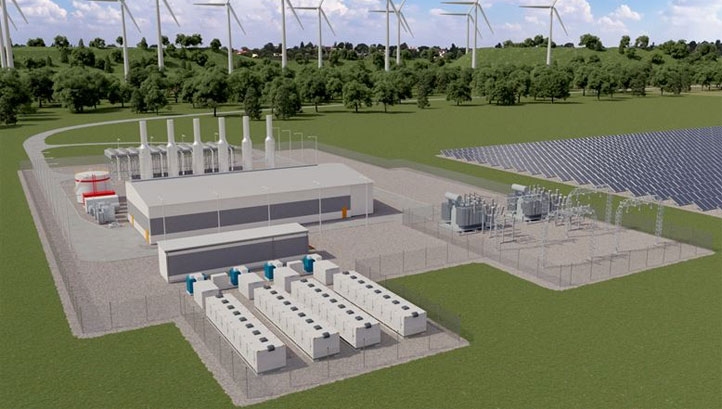I've mused on the need for hugely increase energy storage before so this report reposted from Edie needs no further introduction:
UK must dramatically scale battery energy storage to meet net-zero, report reveals
If the UK is to align its energy sector with its net-zero target, domestic capacity for energy storage and other assets that enable flexibility will need to grow to 49.5GW this decade.

Pictured: An artist's impression of co-located renewable electricity generation and flexibility assets. Image: Wärtsilä
That is according to a new analysis from Wärtsilä, published today (31 March).
The analysis explores how the UK can deliver on National Grid’s ambitions regarding carbon-neutral or even carbon-negative electricity, while also aligning the rest of the energy system with its legally binding national net-zero target. It states that flexible energy assets will help to reduce the cost of the transition while alleviative concerns about the intermittency of renewable energy generation.
Wärtsilä models what it claims is an ideal scenario, in which the UK can transition to 100% renewable and lower-carbon energy. This scenario involves the UK hosting 7.3GW of energy storage capacity – predominantly in the form of utility-scale batteries – as well as 42.2GW of flexible gas power capacity.
Flexible gas has proved controversial in the net-zero discussion. While gas can help grid balancing at low costs and with a rapid turnaround, policymakers in geographies including the EU have argued that it will have no place in the long-term.
With this in mind, Wärtsilä argues that all developers of new flexible gas power capacity should ensure that facilities are ready for future fuels including hydrogen blends. Existing facilities could also be retrofitted, the report states.
The report draws on the organisation’s previous ‘Atlas of 100% Renewable Energy’ to conclude that, by adding flexible gas to the mix and scaling energy storage, G20 nations will reduce the costs associated with the low-carbon energy transition this decade by 38%.
“By building high shares of renewables, we can create the conditions to produce carbon-neutral future Fuels that can decarbonise all energy-intensive sectors, from power to mobility,” Wärtsilä Energy‘s energy business director Pekka Tolonen said.
“To solve this final piece of the net-zero puzzle, the answer once again is to urgently build more renewables, supported by future-proof flexibility solutions.”
Energy Systems Catapult
The Wärtsilä analysis comes on the same day that the Energy Systems Catapult (ESC) is releasing a report detailing policy recommendations for the UK government, regarding electricity market reforms on the road to net-zero.
Entitled ‘Rethinking Electricity Markets’, the ECS paper argues that innovators must be incentivised to develop the low-carbon technologies, products and services needed for National Grid to meet its net-zero ambition. It states that the Government’s current approach is not technology-neutral, which is “stifling” the potential of some flexible and ‘smart’ technologies. For example, it has big commitments to scale up offshore wind, but not the demand-side technologies needed to minimise the cost of this transition.
The report also argues that the Government has not outlined clear targets for the decarbonisation of the electricity grid, or measures to mandate their delivery, beyond the 2050 net-zero target. Many analyses in recent months have stated that Ministers must do more to support long-term climate ambitions with sector-specific measures in the interim.
Policy recommendations detailed in the report are called ‘EMR 2.0’. They include measures to reform the Contracts for Difference auction process, replacing it with a more “outcome-based” system that would better support promising emerging renewable technologies; measures to better support immature technologies in a technology-neutral manner and to embed carbon budget requirements into regulation for the sector.
Ministers are notably in the process of choosing whether to adopt the Climate Change Committee’s (CCC) advice on the Sixth Carbon Budget this year. The proposed carbon budget would see the UK generating 78% less annual emissions in 2035 than it did in 1990. Meeting this target, the CCC claims, will require more policy support for wind generation, energy storage, nuclear and hydrogen.
“The current government-directed approach to energy is like Boris Johnson telling Steve Jobs how to design the iPhone,” ESC’s strategy and performance director Guy Newey said.
“The progress on renewables over the past 10 years has been extraordinary, but if we are to finish the job of decarbonising the power sector – and create new businesses and jobs – we need to unleash the potential of our brilliant digital energy innovators to create a more flexible and greener system.
“History shows that consumers and markets are the key drivers of innovation – and crucially its widespread adoption. Government should step back from micro-managing the electricity mix and empower electricity consumers and markets to drive demand and shape investment for the biggest impact.”
Sarah George
No comments:
Post a Comment